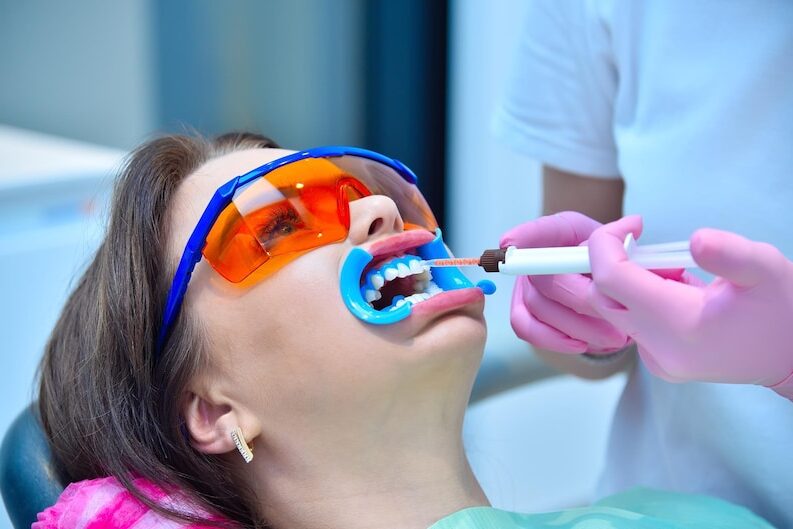
Preventive dentistry focuses on maintaining oral health and preventing dental problems. It involves regular brushing with fluoride toothpaste, flossing, and adopting a healthy diet low in sugary foods and drinks. Regular dental check-ups are important for early detection of dental issues like cavities or gum disease.
Dentists also perform professional cleanings to remove plaque and tartar. They may recommend additional preventive measures such as dental sealants or fluoride treatments to protect teeth. By practicing preventive dentistry, you can avoid painful dental problems and save money on expensive treatments. It’s all about taking proactive steps to keep your teeth and gums healthy, ensuring a bright smile and good oral health for years to come.
Treatments Under Preventive Dentistry

Teeth Cleaning And Polishing
Teeth cleaning and Teeth polishing is a common dental procedure that aims to remove tartar and surface stains from the teeth, promoting oral hygiene and a brighter smile. During a dental cleaning, a dentist carefully uses specialized tools to gently remove plaque and tartar buildup, particularly in hard-to-reach areas. This helps prevent gum disease, cavities, and bad breath. After cleaning, the teeth are polished using a rotating brush and a special toothpaste that buffs away surface stains, making the teeth smoother and more resistant to plaque buildup.
Teeth cleaning and Teeth polishing is an essential part of maintaining oral health, along with regular brushing and flossing. It is recommended to have professional cleanings every six months to keep your smile fresh and healthy.
Sealant Treatment
Sealant treatment is a preventive dental procedure that helps protect the back teeth from tooth decay. Teeth usually have deep grooves and pits that can trap food particles and bacteria, making them vulnerable to cavities. During the treatment, a thin, plastic coating called a dental sealant is applied to the chewing surfaces of the teeth. The sealant forms a protective layer that acts as a barrier, preventing bacteria and food from settling into the grooves. The process is painless and quick, and it can be done in a single dental visit. The average time to perform a dental sealant on a single tooth is 4 minutes.
Sealants are commonly recommended for children and teenagers, but adults with deep grooves can also benefit. By getting sealants, you can significantly reduce the risk of cavities and maintain better oral health in the long run. Regular check-ups are important to monitor the condition of the sealants and ensure their effectiveness.


Anti Cavity Fluoride Treatments
Anti-cavity fluoride treatments helps protect teeth from decay by strengthening the enamel. Fluoride, a mineral naturally found in water and certain foods, has the ability to remineralize weakened enamel and make it more resistant to acid attacks from bacteria and sugary foods. During the treatment, a concentrated fluoride gel, foam, or varnish is applied to the teeth for a short period. The fluoride is absorbed by the enamel, replenishing essential minerals and repairing early stages of tooth decay.
This preventive procedure is beneficial for individuals of all ages, especially those with a high risk of cavities. It is commonly recommended for children, adolescents, and adults with weak enamel, deep grooves in their teeth, or a history of dental decay.
Regular anti-cavity fluoride treatments, along with proper oral hygiene practices can significantly reduce the risk of cavities and promote long-term dental health. It is important to consult with your dentist to determine the most suitable frequency and type of fluoride treatments based on your individual needs.
Frequently Asked Questions
Preventive dentistry involves practices and treatments aimed at maintaining good oral health and preventing dental issues like cavities, gum disease, and tooth loss.
Preventive dentistry is important because it helps you avoid painful and costly dental problems. It focuses on early detection and intervention, preserving your natural teeth and promoting overall oral health.
The benefits of preventive dentistry include reducing the risk of tooth decay and gum disease, saving money on extensive dental treatments, preventing tooth loss, and maintaining a healthy and confident smile.
It is generally recommended to visit the dentist every six months for regular check-ups and professional cleanings. However, the frequency may vary based on your oral health needs, so consult with your dentist for personalized recommendations.
Common preventive dental treatments include dental cleanings, dental sealants, fluoride treatments, oral cancer screenings, and personalized oral hygiene instructions.
To practice preventive dentistry at home, you should brush your teeth at least twice a day, floss daily, maintain a balanced diet, limit sugary snacks and drinks, and use fluoride toothpaste.
Dental sealants are thin, protective coatings applied to the chewing surfaces of the back teeth. They act as a barrier against bacteria and food particles, preventing tooth decay in the deep grooves of the molars and premolars.
Fluoride treatment involves applying a concentrated fluoride solution to the teeth. Fluoride strengthens tooth enamel, making it more resistant to acid attacks and preventing tooth decay.
Yes, children’s dental health can be safeguarded through measures such as regular dental check-ups, fluoride treatments, dental sealants, teaching proper oral hygiene habits, and limiting sugary foods and drinks.
To prevent gum disease, you should maintain good oral hygiene, including regular brushing and flossing, quitting smoking, eating a balanced diet, and visiting the dentist for professional cleanings and check-ups.
Early tooth decay may exhibit signs such as tooth sensitivity, toothache, visible pits or holes in the teeth, white spots on the enamel, or bad breath. Regular dental check-ups can help detect decay in its early stages.
Yes, dental cleaning, also known as prophylaxis, is a crucial part of preventive dentistry. It involves the removal of plaque, tartar, and stains from the teeth, helping to prevent tooth decay and gum disease.
Yes, preventive dentistry focuses on early detection and intervention, which can help identify and address dental issues before they worsen. This can potentially save you from requiring more extensive and expensive dental treatments.
Good oral hygiene not only helps prevent dental problems but also contributes to overall health. Poor oral health has been linked to various systemic conditions like heart disease, diabetes, and respiratory infections.
